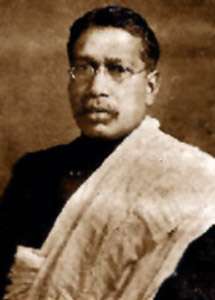Bipin Chandra Pal
| Bipin Chandra Pal | |
|---|---|
 | |
| Born |
7 November 1858 Habiganj, Sylhet District, Assam Province, British India |
| Died | 20 May 1932 (aged 73) |
| Alma mater | University of Calcutta |
| Occupation |
Politician Freedom fighter |
| Organization | Brahmo Samaj |
| Political party | Indian National Congress |
| Movement | Indian Independence movement |
| Signature | |
|
| |
Bipin Chandra Pal (![]()
Early life and background
Bipin Chandra Pal was born in Poil Village, Habiganj District Sub-Division, Sylhet, Bengal Presidency of British India (now partly in Bangladesh and partly in Assam , India), in a Hindu Bengali Kayastha[1] Vaishnava family. His father was Ramchandra Pal, a Persian scholar and small landowner. He studied and taught at the Church Mission Society College (now the St. Paul's Cathedral Mission College), an affiliated college of the University of Calcutta.[2] His son was Niranjan Pal, one of the founders of Bombay Talkies. His son-in-law was the ICS officer, S. K. Dey, who later became a union minister.
Work
Pal is known as the 'Father of Revolutionary Thoughts' in India and was one of the freedom fighters of India.[3] Pal became a major leader of the Indian National Congress. At the Madras session of congress held in 1887, Bipin Chandra Pal made a strong plea for repeal of the Arms Act which was discriminatory in nature. Along with Lala Lajpat Rai and Bal Gangadhar Tilak he belonged to the Lal, Bal and Pal trio that was associated with revolutionary activity. Aurobindo Ghosh and Pal were recognised as the chief exponents of a new national movement revolving around the ideals of Purna Swaraj, Swadeshi, boycott and national education. His programme consisted of Swadeshi, Boycott and national education. He preached and encouraged the use of Swadeshi and the Boycott of foreign goods to eradicate poverty and unemployment. He wanted to remove social evils from the form and arouse the feelings of nationalism through national criticism. He had no faith in mild protests in the form of Non-Cooperation with the British colonialists. On that one issue, the Assertive nationalist leader had nothing common with Mahatma Gandhi. During last six years of his life he parted company with the Congress and led a secluded life. Sri Aurobindo referred to him as one of mightiest prophets of Nationalism.
Literary Work
He wrote several articles warning India of the changes happening in China and other geopolitical situations. In one of his writings, describing where the future danger for India will come from, Pal wrote under the title "Our Real Danger"[4]. The most prominent books of Pal include Indian Nationalism, Nationality and Empire, Swaraj and the Present Situation, The Basis of Social Reform, The Soul of India.
References
- ↑ M.K. Singh (2009). Encyclopedia Of Indian War Of Independence (1857-1947). Anmol Publications. p. 130.
Bipin Chandra Pal (1858-1932) a patriot, nationalist politician, renowned orator, journalist and writer. Bipin Chandra Pal was born on 7 November 1858 in Sylhet in a wealthy Hindu Kayastha family
- ↑ List of distinguished alumni Archived 25 September 2012 at the Wayback Machine.
- ↑ "Bipin Chandra Pal".
- ↑ Madhav, Ram (2014). Uneasy neighbours : India and China after 50 years of the war. New Delhi : Har-Anand Publications. pp. 10, 11, 12. ISBN 978-81-241-1788-0.
- Owen, N (2007), The British Left and India, Oxford University Press, ISBN 0-19-923301-2 .
Further reading
- Lenman, Bruce; Marsden, Hilary, eds. (2005). Chambers Dictionary of World History. London: Chambers Harrap. ISBN 978-0-550-10094-8 – via Credo Reference.